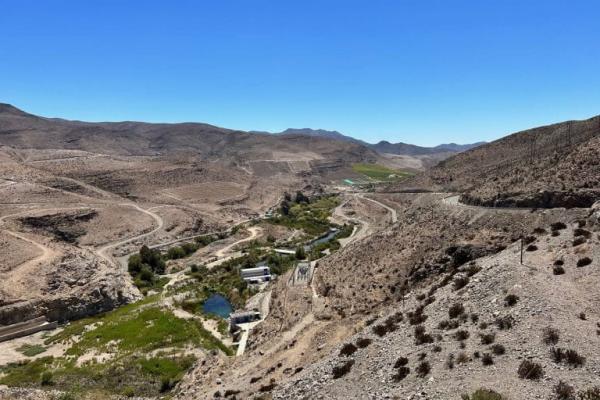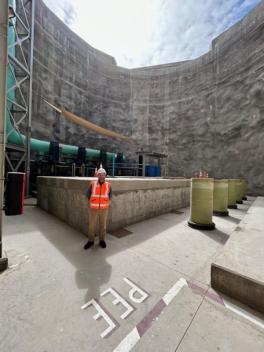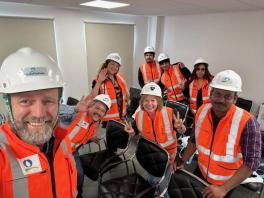Ohio Sea Grant Extension Educator Recounts Fulbright Experience in Chile

From the Cuyahoga River to the northern Atacama Desert in Chile, Ohio Sea Grant Extension Educator Dr. Scott Hardy has helped communities around the world sustainably manage water resources.
For a month in December and January, Hardy served as a U.S. Fulbright Specialist to the University of Atacama (UDA) in Chile to help address environmental issues and water management in the region. Recently, Hardy recounted his Fulbright experience through a series of blog posts. Read Doc Scott’s Travel Blog.
“I really believe in the mission of Extension,” Hardy said. “It’s the idea of taking all that science that happens on campus and trying to use it to educate people who aren’t necessarily affiliated with the university, or to extend that science to inform decision making.”

Hardy, who is now the first educator for The Ohio State University Extension to become a Fulbright specialist, said he’s always been excited about the international side of extension. He’s a member of OSU Extension’s Global Relations Committee and the International Association for the Study of the Commons, and he previously served as a U.S. Peace Corps Volunteer in Honduras.
“It’s always been kind of a dream of mine to serve as a Fulbright agent,” Hardy said. “I was able to go down there and share my experience and help inform some of their decision making and management actions. So it was really, really cool.”
In Chile, Hardy collaborated with local experts, researchers, and government agencies who are working to address water scarcity in the northern Atacama Desert — one of the driest places in the world. Water in the region, which lies in South America’s “Lithium Triangle,” also faces contamination from lithium mining, copper mining, and agriculture. Hardy said the people he spoke to were interested in his work establishing science-driven goals for restoring the Cuyahoga River.
“Here in the Cuyahoga River watershed, we have a really great, well-established formula for identifying impairments to some of the beneficial uses of water,” Hardy said. “In northern Chile, I felt they could learn from some of our experiences when they’re trying to identify benchmarks for success and ecological indicators for their approach to watershed management. So that was really impactful.”
As a Fulbright Specialist, Hardy collaborated with UDA faculty and representatives from the cities of Vallenar and Copiapó. He also gave public and university lectures on water-related topics, held focus groups, and helped improve academic curriculum.
“I would go to these little towns way up in the Andes Mountains, and I’d meet with officials and talk about water for a while,” Hardy said. “I thought it was neat that people knew of The Ohio State University and the Sea Grant program, and they really thought we had a great reputation.”
The Fulbright project aimed to develop long-term collaboration between the U.S. and Chile, and Hardy said he hopes to invite faculty from UDA to visit Ohio State and Stone Laboratory and share their own water management strategies.

Other highlights from the blog include Hardy’s visit to a water desalinization plant, views at an astronomical observatory, and experience tasting foods like completos and South Pacific Spiny King Crab.
“Many of the environmental challenges we face as a society are global in nature, and I believe that, in the spirit of extension, looking beyond the borders of Ohio and the U.S. is important,” Hardy said. “Taking some of that science developed in Columbus and Wooster and Lima and Mansfield to inform decision-making not only across the 88 counties in Ohio but across the whole globe, that’s really an inspiring role for Ohio State and people like me who are extension educators.”
The Fulbright Specialist Program is administered by World Learning and is sponsored by the Bureau of Educational and Cultural Affairs of the U.S. Department of State.
Ohio Sea Grant is supported by The Ohio State University College of Food, Agricultural, and Environmental Sciences (CFAES) School of Environment and Natural Resources, Ohio State University Extension, and NOAASea Grant, a network of 34 Sea Grant programs nation-wide dedicated to the protection and sustainable use of marine and Great Lakes resources. Stone Laboratory is Ohio State’s island campus on Lake Erie and is the research, education, and outreach facility of Ohio Sea Grant and part of CFAES School of Environment and Natural Resources.
This story was originally published by Ohio Sea Grant on May 29, 2024.
